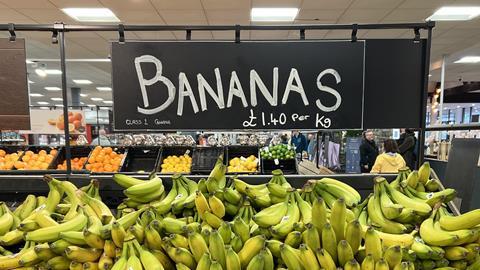Unless the supply of bananas into European markets can be managed somehow, shippers in Latin America, Africa and the Caribbean will always be at the mercy of retailers.
In his recent article for The Grocer, NGO Banana Link’s international coordinator Alistair Smith argues that the economics of selling bananas too cheaply makes no sense.
He says the prices that retailers pay suppliers must go up, and that the era of super-cheap banana prices for consumers must draw to a close.
The bottom line, he suggests, is that consumer prices for the fruit – and correspondingly prices paid per box to producers – are nowhere near sustainable.
More controversially, he adds: “The latest message from the World Banana Forum is not an appeal to the good ethics of major buyers but can be taken as a warning that if price increases are not agreed, *they will be imposed*.”
Smith doesn’t detail who might impose such an increase. But he does argue that climate change will make banana exports unviable in many countries of origin. And, if so, rising temperatures will lead to lower production and higher prices.
Nurture or nature
There is a significant difference between political intervention and market forces when it comes to retail pricing. If Smith is suggesting the former, it is an empty threat. The EU is not a command economy; it cannot dictate to the market.
The supply versus demand example, however, is more compelling. If supply shortens, market forces will dictate the price. If production is unsustainable as a result of climate change-related alterations to weather patterns, so prices will indeed rise.
What complicates the argument on pricing is that macro events are just one variable in the equation. In the case of bananas, the important relationship is not between producer and consumer; the relevant transaction is between distributor and retailer.
It is too simplistic to think that the price consumers pay at the checkout accurately reflects the value received by producers.
If retailers choose to use the banana category as a loss-leader, why should they be prevented from losing money?
Even if the retailer were to bow to demands to pay more, there is no guarantee this increase would not be pocketed by the distributor, which has its own sourcing arrangements.
And there is another important point to make here. Until, or unless, the retailer establishes a direct supply chain sourcing relationship with the producer, it is not the *primary* concern or responsibility of the retailer to ensure the head of the chain is paid a fair wage.
They will argue that it is good enough for the other links in the chain to have the relevant certifications. Given that there is no incentive for retailers to integrate backwards along the chain into ripening rooms, terminal handling and shipping, this position is surely unlikely to change.
Time to take control?
How then best to reverse the chronicle of a banana supply crisis foretold? The salient question is why should the market take responsibility for something it cannot manage or control?
With the exception of kiwifruit marketer Zespri, fruit shippers into the EU make it far too easy for retailers and consumers because they supply more than the market needs.
This is almost guaranteed to generate sub-economic returns for the smallest and the least efficient.
If producer-exporter delegations in Latin America, Africa and the Caribbean want to restore some balance and influence – and thereby improve the lot of their industry stakeholders – they need look no further than their own borders.
Find a way to manage supply. Instead of repeatedly calling for the retailers to act fairly, they themselves should take responsibility.




